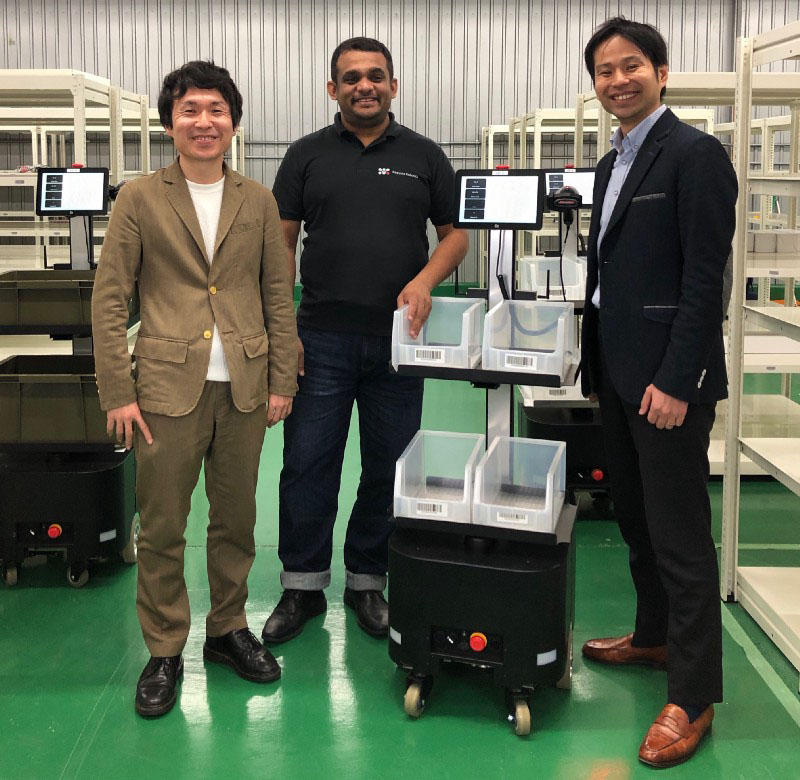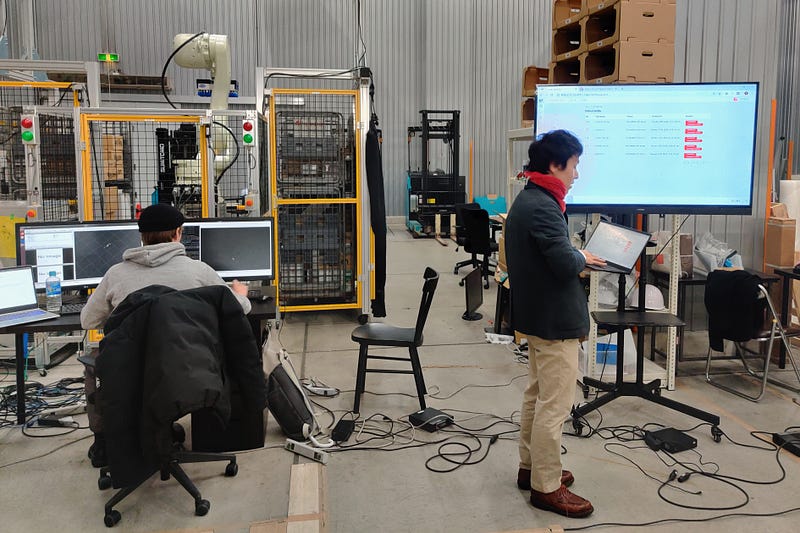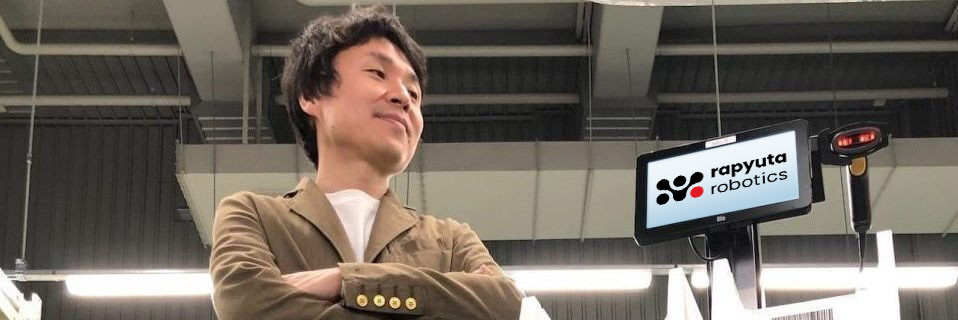Rohit: Taka San, good morning! Can you tell us about your early life, where you worked before this, and how did you join Rapyuta?
Taka: Good morning! After I graduated from university, I joined a consulting firm, Deloitte Tohmatsu Consulting, as an IT consultant. I mainly managed ERP implementations at large Japanese enterprise clients, and my main domain area was logistics & supply chain.
I spent 10 years in consulting and, during that time, I worked on more than 6 projects. After 10 years in consulting, I wanted to move to an enterprise company so I can learn more about hands-on operations and was itching for a deep dive into real operations, building things from scratch. I did not want to be limited to system implementation, I wanted to gain operational wisdom so I can propose more solid solutions to the clients.
So, I joined Evonik, a German chemical company, as a supply chain manager and then, moved to GAP Apparel as a project manager. It was an e-commerce fulfilment centre launch project where my main goal was to improve the warehouse productivity and I did really get my hands dirty there!
Then I moved to Amazon, I was the first person to join the Amazon Fresh Launch Project in Japan and spent 2 years on this project. My main role as a senior in-stock manager was to build the vendor network with manufacturers and distributors of food, and determine how to transport their products into the fulfilment centre. Networking and collaborating with suppliers, manufacturers, distributors to make them work together required lots of effort and I am glad we achieved that. Also, my main task was how to control the optimal inventory since both lack or surplus can have adverse effects.
After the successful launch of Amazon Fresh I needed a new challenge! I was growing more interested in automation and innovation in warehousing operations and I got to meet Ryo, the business head of Rapyuta Robotics. I liked the idea about the rapyuta.io platform; and, luckily, Rapyuta needed a specialist in the logistics domain and that’s how I found my fit here. I joined Rapyuta last April, so almost one year!

Taka Kobori with Gajan Mohanarajah, CEO and Ryo Mori, the Business Head of Rapyuta Robotics
Rohit: Almost a year with Rapyuta! So what do you do here?
Taka: My title is business development manager, and I mainly focus on the logistics providers, especially the customised logistics provider. Moreover, I have been working on building a Logistics Provider Solution. In warehousing, there are many known issues that remain unaddressed. For example, hiring is a major challenge due to labor shortage issues in Japan, and it is tough to estimate the proper headcount required in their warehouses and manpower planning has lots of inefficiencies.
So that’s what makes them reach out to us. — “How to transform their warehouse operations by using automation, robotics or AI-driven solutions.”
Since I have experience in logistics and warehousing, I can relate to what the customer is talking about and empathize with their pain points. My goal is not just to propose them the robotics solution but also to consult them on the issues they are facing. So, in summary, my main role is to provide solutions to logistics companies.
Also, I’ve undertaken the project management for an PA-AMR (Pick Assist Autonomous Mobile Robots) implementation initiative. Here the PA-AMRs collaborate with the human picker workers to significantly reduce their walking distance and search time. This gives a significant boost in the fulfillment speed/efficiency without warehouse disruption of reconfiguration.
Rohit: What are the common questions you come across? How do you convince clients?
Taka: The starting point is the strength, uniqueness of Rapyuta, and our competitive advantage as compared to other robotics companies.
When I introduce the AMR solution, their next typical question is “How many robots can fit in their warehouse or how much productivity improvement can happen?”
So, yes these are 2 big questions.
Rohit: So how do you estimate or calculate these numbers before you talk to these clients?
Taka: There are 2 approaches. one is from my past experience where I can estimate the numbers.
In the other, we have few leading Japanese logistics clients, and we have done pilot projects for them. The data from the experimental work and performance tests is a good benchmark. So this comes across as an example. It may not fit their exact specifications but gives them an idea. If the customer is still not convinced, I propose to them our simulation tool.
Of course it is better to gauge performance in the real world but, unfortunately, implementation takes time and resources, and it becomes a costly exercise, which is indeed the reason for lack of wider adoption of robotics solutions. So, I first explain how our robots work, and then how accurate our simulation tool is.
With the help of simulation tools, we are able to estimate the optimal number of robots required to work with a varying supply of human pick workers. This is our approach.
Rohit: I think demo days are super important to you. So how are you on a demo day morning, because you do seem to be a bit on the edge?
Taka: Demo Day morning? Oh yes! It’s all very exciting to me as I really like presenting. I started my career as a consultant and, as a consultant, you get really good at presentation, hearing the customer issues, and coming up with a solution for them. I really like that. So yes, I am very excited to create the demo scenario and present it to the customers.
Rohit: How do you prepare for the demo day?
Taka: Preparation starts from 2 to 3 days prior to the demo. Initially, I need to create a document about the demo scenario, briefing what’s the impact of that demo, and what is the expectation of the business team. I then share this with the engineering team.
In our weekly product meetings, I share requirements and updates with the product manager and the engineering team. We always do a rehearsal a day before the demo day. Hence, it is super important for me to be clear about my expectations and keep all the stakeholders aligned to be ready in time.
A day prior to the demo day, I am usually in the field, checking the readiness of the engineering team. Our product is changing every day, the software is improving. So, even if the last month’s demo was a success, we need to check and test everything rigorously, as if it is a new demo.

Rohit: What are some of the interesting questions you get asked from clients? How do those questions impact your sales process?
Taka: One of our customers, he is a very senior person and very knowledgeable about warehouse operations asked the question “Is there any way robots can speak or talk to humans in the warehouse?”
It was very interesting as the work in a warehouse is under very tough situations and working 8 hours a day, just doing the picking, becomes monotonous. So, you can imagine their situation. It is very important to create a good working environment for them and keep them motivated, which is also a site manager’s job.
So after implementing our solution, how can our robots work together with the field operator? We need to create a unique point of communication, and keep them motivated while working with robots. In case the operator is sick, robots can also be used as a communication tool. this was very interesting.
Rohit: Oh yes, it is very important as ultimately we are dealing with humans and empathy is critical while we think of solutions. So what is the most interesting part for you in the sales process? Right from approaching the clients, to pitching, to proposals, negotiations, and, finally, implementation.
Taka: I love many things but, yes, being the bridge between engineering and business is most exciting. We have some amazing engineers but they don’t have much business exposure, and it is hard for them to articulate the benefits of the product to the market. They are doing a lot of hard work to solve the customer’s problems and I feel happy that I am able to get their solutions out to the market.
My motto has been ‘customer obsession’, which is a leadership principle I learnt at Amazon. Every time a customer is demanding, the demanding attitude makes us stronger. That kind of mindset is really important at Rapyuta, and I like to make our customers happy with our technology and surprise them with our solutions.
Rohit: Very interesting. My next question is about you. What are your motivations? What drives you every day to give your best?
Taka: Motivate me everyday…hmm…hahaha!
What we are doing actually! Right now, the PA-AMR is not operational anywhere in Japan. So, we are the first in Japan to implement this, and it is a fantastic case study on how robotics can really contribute to warehouse operations.
Historically, in Japan, they have invested in automation robotics and warehouse improvement operations but it has not been successful. Every field operator feels that robotics is useless and I want to change that mindset. Our robotics solutions are really efficient and productive and I want to make this happen at a wider scale.
I have great partnerships and relationships with customers, and I don’t want to disappoint them.
So yes, these are my prime motivating drivers.
Rohit: That’s from a professional point of view. From a philosophical point of view, what drives Taka-san?
Taka: I am curious about things and I want to be innovating all the time. Also, my area of specialization is warehousing and logistics, so I want to be known for providing robotics solutions and making our customers happy.
Even if Rapyuta was earning lots of money, that would not be my motivation. I think it’s innovating and making my customers happy that drives me.
Rohit: Last question. What is your message to your clients or anyone who wants to look at robotics solutions?
Taka: Most of our clients believe in our technology and they have taken a bet on us. They have taken risks but they have a mid or long term vision. Their belief in our solutions gives us a lot of confidence. I want to thank them and I really appreciate their broader vision and belief in us.
Rohit: Thank you, Taka, for your time. This was a wonderful chat.
Taka San: Thank you. I enjoyed it too.
Please visit our website to know more about us. For any feedback or queries, feel free to write to us on info@rapyuta-robotics.com!




